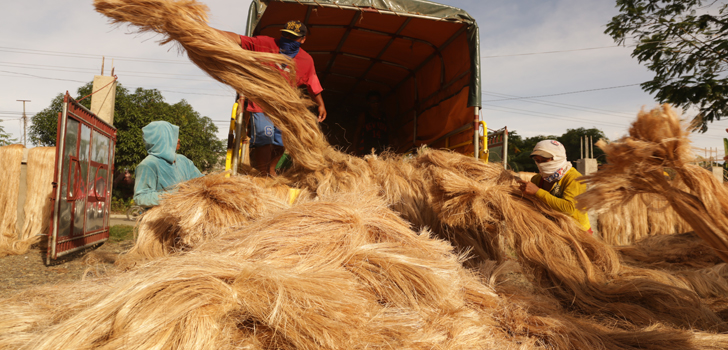 Abaca Start-up Enterprise. Laborers of the Catanduanes-based Pinoy Lingap-Damayan Multipurpose Cooperative (PLDC) unload dried abaca fiber for baling at the PLDC's facility in the capital Virac. With a P25.4 million-worth of start-up enterprise development assistance package, the cooperative is one of the abaca industry players around the country assisted by the Department of Agriculture's Philippine Rural Development Project (DA-PRDP). According to DA Secretary Manny Piñol, there is great demand for abaca in the world market while there are only two other countries producing it besides the Philippines—Ecuador and Costa Rica. (Photo by Kathrino V. Resurreccion, DA-PRDP NPCO InfoACE Unit)
Abaca Start-up Enterprise. Laborers of the Catanduanes-based Pinoy Lingap-Damayan Multipurpose Cooperative (PLDC) unload dried abaca fiber for baling at the PLDC's facility in the capital Virac. With a P25.4 million-worth of start-up enterprise development assistance package, the cooperative is one of the abaca industry players around the country assisted by the Department of Agriculture's Philippine Rural Development Project (DA-PRDP). According to DA Secretary Manny Piñol, there is great demand for abaca in the world market while there are only two other countries producing it besides the Philippines—Ecuador and Costa Rica. (Photo by Kathrino V. Resurreccion, DA-PRDP NPCO InfoACE Unit) Farmers’ co-op raises commercial value of Catanduanes abaca
A proponent group of the Department of Agriculture’s Philippine Rural Development Project (DA-PRDP) in Catanduanes has successfully raised the commercial value of abaca provincewide, during the dry-run stage of its approved subproject.
The Catanduanes-based Pinoy Lingap-Damayan Multipurpose Cooperative (PLDC), which was recently awarded a P25.4-million worth of enterprise development assistance package from the PRDP, has already demonstrated its capacity to improve the livelihoods of their members as it set the selling price of abaca from P55 to P75 per kilogram in the province.
According to Antonio Jimenez Jr., PLDC’s general manager, the PRDP wanted to see if the cooperative is really up for the job hence it promptly asked the group to undergo the prescribed dry-run, wherein the proponent would have to undertake all stages and processes required of the proposed enterprise, from securing raw materials to finding new buyers.
“We really studied hard especially because at first, we had difficultly learning the right pricing of abaca fiber, including the grading of the commodity depending on the quality,” Jimenez said, adding that eventually, they were able to secure new prospective buyers Catanduanes.
What made the dry-run a more challenging stage for the group was the fact that prior to their current project under PRDP, the cooperative had no experience in dealing with abaca trading, except that many of their members happened to be abaca farmers themselves.
Jimenez also said that they conducted an in-depth study on the immediate needs and concerns of their members and they discovered that all abaca farmers need to secure food and other similar sustenance for their families before they could go and harvest abaca plants, usually lasting several days considering that plantations are usually kilometers away from their respective houses.
“Many traders themselves are also storekeepers and they would regularly loan food and other basic consumable goods to abaca farmers, with payments usually done after the harvested fibers were sold,” he said.
There is nothing wrong with the arrangement according to Jimenez, except that the storekeepers would require the hapless farmers to sell their crop to them, of course, at a lower price. Jimenez added they are now planning to run a food store for our members to solve the problem.
According to the cooperative’s top official, the test run allowed them to realize their capacity to collect as much as 25 tons of abaca fiber every week, a feat difficult to achieve even by seasoned by traders.
“Now we are sought after by some major buyers across Luzon,” he stressed.
He also added that aside from the funds coming from PRDP, his group is thankful to the Project for giving them the opportunity to learn the ropes of the trade through its project prescriptions.
The PLDC is shelving P9.2 million from its own coffers as counterpart to complete the P25.4 million required funding for the project.
The components of the enterprise project include a main warehouse to house the raw and semi-processed fibers, several trucks and forklift for delivery, tools and equipment, and a working capital for one month operating expenses and cash for buying raw materials. Several buyers are already waiting for the PLDC’s much improved volume capacity that will come from the release of the approve funds. ### (Alladin S. Diega, DA-PRDP NPCO InfoACE Unit)
